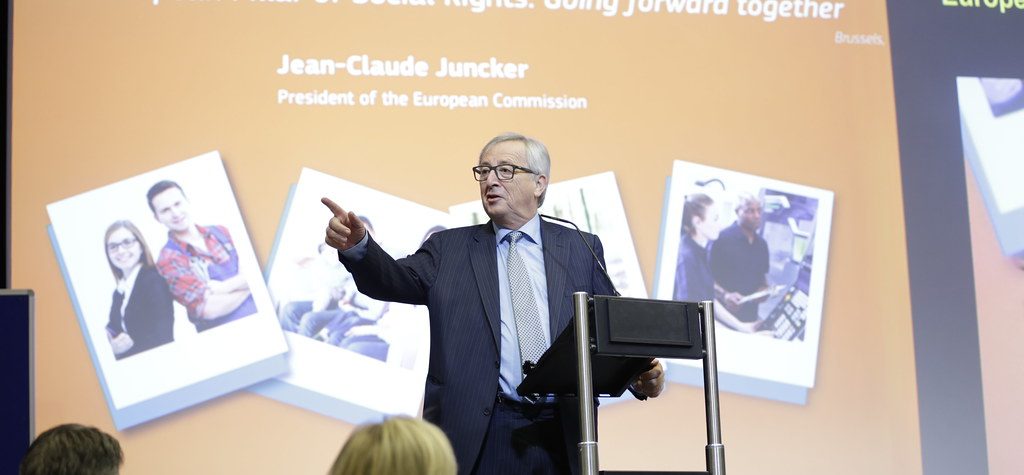The European Commission promised a transformation of EU politics when Ursula von der Leyen and her colleagues came into office in late 2019. Of course, no one expected the continent would be engulfed by a pandemic. But as the coronavirus crisis recedes over the summer, ambitious plans for transition will regain the spotlight of European politics.
Brussels has focused on three visions in particular: ecological transformation through a Green Deal, digital transition through “strategic autonomy” and social transition to greater Europe-wide solidarity, convergence, and social justice.
The recent Social Summit in Porto put this latter topic, the European Pillar of Social Rights, back into the headlines again. As von der Leyen has said herself, “as we overcome the pandemic … it is time to also adapt the social rulebook. A rulebook which ensures solidarity between generations.”
One-size-fits-no one
The Pillar includes ideas such as a Europe-wide minimum wage, fair working conditions, greater training and educational opportunities for workers, social programs for those in need, an “adequate minimum income” (which sounds like a Europe-wide Universal Basic Income) and muchmore.
However, the European Pillar of Social Rights as presently discussed suffers from manifold defects which would harm European competitiveness, will do little good for those the Pillar tries to target, and further increases the scope of Brussels competences for reasons that seem spurious at best.
Indeed, the Pillar of Social Rights suffers, first of all, from similar problems as the Green Deal and the digital transition programs: namely, the general assumption that problems can only be solved top-down and through one-size-fits-all mega-plans. And yet, particularly in a time when Europe needs to become more competitive globally so as to get out of the COVID economic slump, it is not a good idea to further increase the size of government in the economy through centralised planning. Economic growth happens through free entrepreneurship, innovation, and creativity, not bureaucratic welfare, particularly of such a gigantic scale as a continent-wide social vision.
The wrong rights
That centralised approach – that Brussels should be more in charge of social policies than member states – also disregards the complexity of political, economic and fiscal systems within member states, all of which have crassly different conditions and systems. One of the foundations – pillars, one might say – of EU policy, as enshrined in its treaties is the principle of subsidiarity, meaning that tasks should always stay at the lowest and most decentralized level possible. The Pillar of Social Rights turns this on its head, compiling a long list of things the EU is supposedly in need of performing. It is economic and social engineering from the top-down, rather than leaving things simply to more local and national levels.
Beyond that, however, the Pillar of Social Rights brings up much more general questions of what the EU actually thinks rights are. Indeed, reading through these “social rights,” which are, according to the European Council, “human rights,” one cannot escape astonishment of what is considered a ‘right’ in Brussels. We read of a ‘right’ to “work-life balance,” a ‘right’ to “social housing,” and even a ‘right’ to “access to essential services.” Essential services in the EU termina not only include food (which is not mentioned) and water (which is mentioned), but even “energy, transport, financial services and digital communication.” What that would mean in concrete policy visions is unclear: would every European have a ‘right’ to a laptop and a Facebook account, as well as a stock portfolio? In any case, it is unknown whether a ‘right’ to digital communication is what the freedom fighters throughout world history were hoping to achieve.
Indeed, the EU’s proposal is littered with so-called “weasel words,” as Friedrich Hayek called them, words that simply sound good and can be used to justify any policy. The Pillar of Social Rights includes little policy details, little to no justifications why Brussels needs to do all of this, but many “weasel words:” all of these ideas Brussels is considering are obviously “social,” “just,” “fair,”, “inclusive,” and would expand “rights.” Who would be against that, after all? And yet, it neither explains why these policies would have that ‘just’ nature nor what the EU even means by these words. Particularly when it comes to ‘rights,’ it seems as though Brussels simply thinks that anything is a right which Brussels wants to be a right.
Arbitrary, aimless
Thus, most of the Pillar of Social Rights is arbitrary and aimless. The constant question that comes up is: why? Why is x and y a ‘right?’ Why should 60% of Europeans participate in some kind of training by 2030, which is one of the main goals of Pillar? Why 60%? And even more so, why should Brussels be in charge of this? Couldn’t individuals and companies simply figure this out for themselves?
Needless to say, all of the ideas proposed are made with good intentions. It is obviously not wrong to want to help the poor and those in need. It is obviously not wrong that every worker should have good working conditions. And no, it is not wrong to want to prepare workers for future innovative transformations, which means training will have greater value.
Nonetheless, the Pillar of Social Rights is a perilous program which lacks prudence and any notion of limits of what politics, particularly centralised one, can do. And even if it does have good intentions, what it never even tries to answer is why the EU should do all this. By not answering this, the European Pillar of Social Rights merely looks like another power grab.


